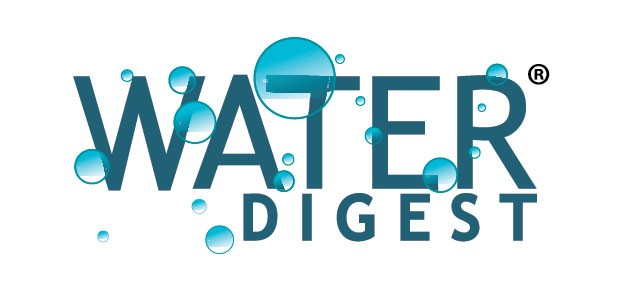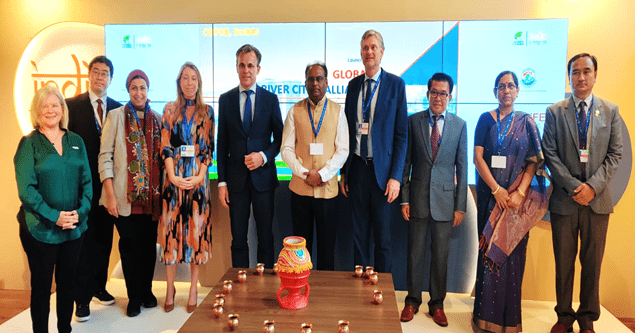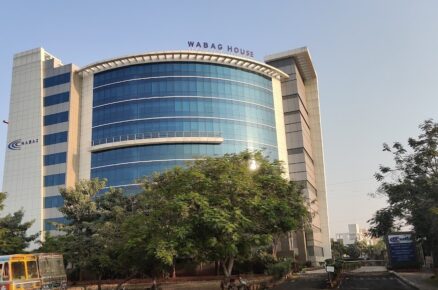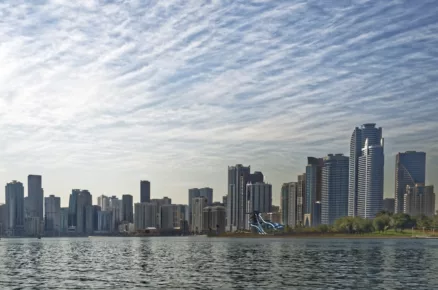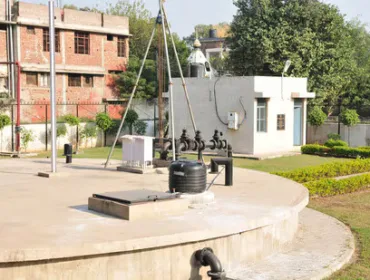The Global River Cities Alliance (GRCA), led by the National Mission for Clean Ganga (NMCG) under the Ministry of Jal Shakti, Government of India, was launched at COP28, the United Nations Climate Change Conference in Dubai, United Arab Emirates, with countries namely India, Egypt, Netherlands, Denmark, Ghana, Australia, Bhutan, Cambodia, Japan and river-cities of The Hague (Den Haag) from the Netherlands, Adelaide from Australia, and Szolnok of Hungary and International funding agencies the World Bank, Asian Development Bank (ADB), Asian Infrastructure Investment Bank (AIIB) and knowledge management institution like KPMG entering into a partnership, widely expanding the reach of the existing River Cities Alliance (RCA), formed by NMCG in association with National Institute of Urban Affairs (NIUA) in 2021.
GRCA is a unique alliance covering 275+ global river cities in 11 countries, international funding agencies and knowledge management partners and is the first of its kind in the world. The launch of GRCA signifies a momentous step in global efforts toward river conservation and sustainable water management. Following this, partner countries are poised to coordinate post-COP activities, shaping the architecture of GRCA for effective implementation.
Addressing the GRCA launch event through a video message, the Union Minister for Jal Shakti, Shri Gajendra Singh Shekhawat, highlighted the guidance of Prime Minister Shri Narendra Modi and emphasized the significance of the River Cities Alliance (RCA), launched in 2021 to foster the sustainable development of river cities. He expressed satisfaction with the collaboration between Namami Gange and the Mississippi River Cities and Towns Initiative (MRCTI), marked by signing a Memorandum of Collaboration (MoCP). He noted that since its inception, RCA has expanded to include 143 member cities in India, including the city of Aarhus, Denmark and has emerged as a catalyst for key frameworks for sustainable urban river management. He noted that the efforts of RCA have received recognition and appreciation from international stakeholders.
Shri Shekhawat emphasized the visionary goal of globalizing the RCA by integrating urban water management into Urban Planning and the launch of the GRCA at COP 28 as a monumental stride in global endeavours against climate change. The Union Minister stressed India’s crucial role in sustainable river-centric development, viewing this initiative as a roadmap for climate resilience and a better future for future generations. He reiterated strong support for climate action.
Special Secretary & Director General of NMCG, Shri G Asok Kumar, said that India has been making strident but confident, path-breaking initiatives in many sectors, including the water and sanitation sector, under the leadership of Prime Minister Shri Narendra Modi in the last 9 years. Starting with the world’s largest sanitation intervention, the Swatch Bharat Mission, in which 100 million toilets in rural areas and 6 million in urban areas were built in the 2014-2019 period; the starting of Namami Gange in 2014 to clean and rejuvenate the holy Ganga River, the program which has now become one of the top 10 World Restoration Flagships; launching of AMRUT and smart cities projects in 2015 for the improvement in urban water sector; formation of in Ministry of Jal Shakti in 2019; launching of “Jal Jeevan Mission” in 2019 to provide functional tap connections to every rural household and the “Jal Shakti Abhiyan: Catch the Rain” campaign in 2021; enactment of Dam Safety Act in 2021 etc, the initiatives are pioneering.
In the National Ganga Council meeting in 2019, PM Shri Narendra Modi exhorted that “there is the need for new river-centric thinking in planning for cities on the banks of the river. The river health needs to be mainstreamed into the urban planning process by developing URMP. Cities should be responsible for rejuvenating rivers. This should be done not just with the regulatory mindset, but also with development and facilitatory outlook.” This led to the formation of the RCA in India in 2021, which is now being expanded as the GRCA. Shri Kumar presented the framework of urban river management plans (URMPs) and the positioning of GRCA as a unique platform for knowledge exchange, river-city twinning, and the dissemination of best practices. He said that the GRCA platform will foster shared expertise and provide opportunities for global funding agencies to engage with river cities.
In a noteworthy address, Shri Sadhguru of the Isha Foundation drew attention to the impact of climate changes on water, particularly the rivers, many of which have dried up. He emphasized the need for tree plantation and people’s participation in river conservation, giving the example of his “Rally for Rivers” initiative. He underscored the intensity and seasonality of rainfall in tropical regions compared to other climates and that while the total water volume remains constant, the rate of change over time differs, highlighting the intense nature of rainfall in tropical areas. Sadhguru advocated for the establishment of dedicated businesses focused on sewage processing. He stressed the critical importance of efficient wastewater management within each sector and urgently addressed the need to tackle industrial sewage for effective water management.
Global leaders, such as H.E. Mr. Mark Harbers, Minister of Infrastructure and Water Management, Government of the Netherlands and H.E. Prof. Dr. Hani Swilam, Minister of Water Resources and Irrigation, Government of Egypt, underscored the urgency for secure water supplies and sanitation worldwide through GRCA. They were joined by international counterparts from other countries, such as Mr Ole Thonke (Under-Secretary for Development Policy, Government of Denmark), Mr Chuop Paris (Secretary of State, Ministry of Environment, Kingdom of Cambodia), Mr Takahiro Konami (Director for International Affairs, Ministry of Land, Infrastructure, Transport, and Tourism, Government of Japan), Mr Karma Tshering (Secretary of Energy and Natural Resources, Kingdom of Bhutan), Ms. Karlene Maywald (South Australian Water Ambassador, Government of Australia), Mr. Ing. Godfred Fiifi Boadi (Ministry of Sanitation and Water Resources, Ghana) and Ms. Roos Meilink (Chief Resilience Officer from Den Haag, Government of the Netherlands). The leaders emphasized and expressed hope for increased collaboration within the alliance. They stressed the importance of aligning with Indian cities for mutual learning, emphasizing a holistic approach that includes water treatment plants and innovative sludge utilization.
The event also marked the presence of multilateral institutions such as The World Bank, Asian Development Bank and Asian Infrastructure and Investment Bank. They appreciated the initiative and extended their full support. Mr. Erwin De Nys (Practice Manager for Climate Finance Mobilization at The World Bank) discussed the need to enhance water security through funding and technical assistance, particularly in sanitation, irrigation, and building resilience against natural disasters. Mr. Satoshi Ishii (Sector Director for Water and Urban Development at the Asian Development Bank) emphasized the strong imperative for cleaning and revitalizing river ecosystems for the well-being of rivers, ultimately improving their quality and sustainability. Mr. Ankur Agrawal (Investment Operations Specialist- AIIB) emphasized the crucial link between urban areas and rivers, stressing the need for enhanced water management amid climate challenges. emphasized the holistic approach of GRCA in addressing climate change, urban development, and water security. Mr. Sumouleendra Ghosh (Global Water Lead & Partner at KPMG) and Dr. Debolina Kundu, Director, NIUA, emphasized the holistic approach of GRCA in addressing climate change, urban development, and water security. Their collective commitment aims to propel sustainable initiatives, knowledge sharing, and collaborative efforts for a resilient global water future.
Source and Image courtesy: PIB
